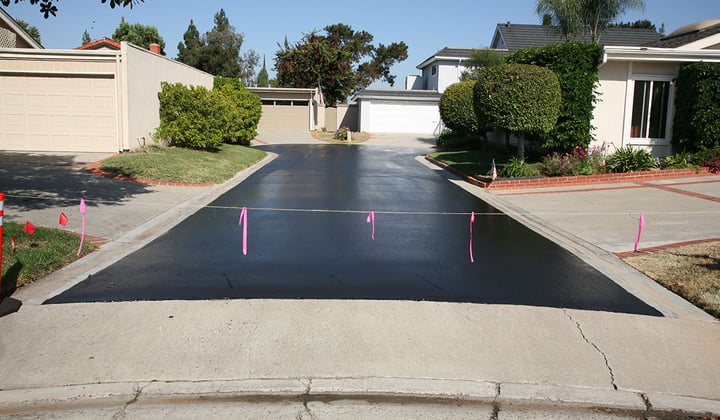Long-lasting Outcomes: Asphalt Spot Repair With Precision Sealing
Cold Mix Asphalt Vs. Hot Mix Asphalt: Which Is Right for You?

Make-up Differences
Cold mix and warm mix asphalts differ dramatically in their structure, with distinct characteristics that affect their performance and applications. Cold mix asphalt is generated by emulsifying the asphalt binder with water and an emulsifying representative prior to mixing it with aggregate. This method enables the asphalt to be practical at reduced temperatures, making it ideal for short-lived repairs and for use in cooler weather condition problems. Hot mix asphalt, on the other hand, is made at high temperatures, normally between 300-350 ° F, which assists to attain much better compaction and an extra durable end product. The warm mix asphalt manufacturing procedure involves heating up the accumulation and asphalt binder separately before integrating them at the asphalt plant.
In addition, cold mix asphalt often tends to be less dense and a lot more versatile than hot mix asphalt. This adaptability makes it far better matched for areas with greater levels of activity, such as driveways or roadways with rush hour. On the other hand, warm mix asphalt is known for its high longevity and resistance to rutting and cracking, making it a recommended choice for freeways and high-traffic roadways where durability is crucial.
Installation Process Variances
The procedure of mounting cold mix and hot mix asphalt shows notable variations in their requirements and procedures. In comparison, hot mix asphalt demands a much more sophisticated installation procedure. Due to the heating requirements, warm mix asphalt installments are commonly carried out by experts with specialized equipment, making sure a more irreversible and structurally sound outcome.
Durability and Longevity Variables
When taking into consideration asphalt options, toughness and long life are vital elements to review for lasting pavement efficiency. Hot mix asphalt (HMA) is understood for its remarkable toughness and long life.
In regards to durability, HMA typically outshines CMA due to its exceptional strength and resistance properties. HMA pavements have a longer service life, requiring less regular fixings and maintenance, which can convert to cost savings in the future. Additionally, HMA pavements are much more conveniently customizable to fulfill specific task requirements, even more boosting their longevity.
Cost Factors To Consider
Thinking about the monetary ramifications is an essential aspect when evaluating the choice in between warm mix asphalt (HMA) and cool mix asphalt (CMA) for pavement tasks. While the initial cost of warm mix asphalt is usually greater than that of chilly mix asphalt, HMA usually gives an extra affordable solution in the lengthy run due to its exceptional durability and long life.
In enhancement to material prices, it's important to consider the costs associated with installment and upkeep when contrasting HMA and CMA. Ultimately, the decision between HMA and CMA must take right into account not simply the first expense however likewise the lasting monetary implications to determine the most economical alternative for the details pavement task.
Environmental Influence Contrast
Comparison of the environmental effects in between hot mix asphalt (HMA) and chilly mix asphalt (CMA) discloses unique distinctions in sustainability practices. HMA production calls for heats, causing increased energy intake and greenhouse gas discharges. The procedure also launches unstable natural substances (VOCs) and dangerous air contaminants (HAPs) into the environment. On the other angle parking hand, CMA is produced and used at reduced temperature levels, reducing energy use and emissions considerably. The reduced production temperature levels of CMA cause reduced fuel intake and reduced levels of carbon dioxide emissions, making it a more eco-friendly alternative.
Moreover, the use of CMA usually entails recycling existing asphalt sidewalk, promoting source conservation and minimizing the quantity of waste sent out to garbage dumps. This reusing element even more enhances the sustainability of CMA compared to HMA. In general, when taking into consideration the environmental influence, CMA becomes a more ecologically lasting choice because of its lower power needs, reduced emissions, and the capacity for recycling existing materials. By choosing CMA over HMA, roadway construction tasks can contribute favorably to environmental preservation efforts.
Final Thought
In conclusion, the option in between chilly mix asphalt (CMA) and hot mix asphalt (HMA) depends on numerous elements such as make-up, installation process, durability, long life, expense, and environmental influence. cold mix asphalt. While CMA provides a cost-efficient and quick service for small repair work, HMA makes sure premium toughness and durability for rush hour areas. Take into consideration these elements very carefully to identify which kind of asphalt is the best option for your paving requires

Considering the financial ramifications is a critical facet when examining the choice in between hot mix asphalt (HMA) and cold mix asphalt (CMA) for sidewalk tasks. While the first price of warm mix asphalt is normally greater than that of cool mix asphalt, HMA often provides a more cost-effective service in the lengthy run due to its premium durability and longevity. cold mix asphalt.Contrast of the ecological effects in between warm mix asphalt (HMA) and chilly mix asphalt (CMA) exposes distinctive distinctions in sustainability methods.In conclusion, the selection in between cold mix asphalt (CMA) and hot mix asphalt (HMA) depends on different variables such as composition, installation process, durability, long life, price, and environmental influence